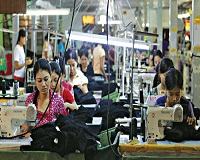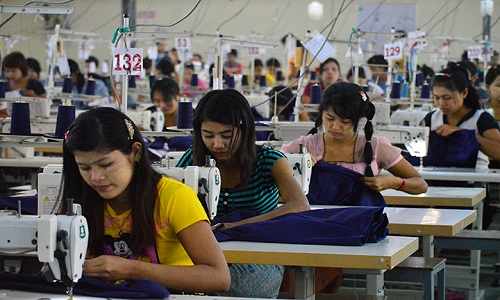"Burma’s garment and footwear exports clocked in $3 billion in 2017, a growth of 25 per cent over last year. Factories have expanded from Yangon’s Hlaing Tharyar industrial zone to rural regions, in the wake of a tax holiday of seven or five years meant to encourage operations in less developed parts of the country. The size of garment manufacturing operations is also increasing from a mean size of 750 employees to factories up to 5,000 to 7,000 workers. Amid this growth, there arises the challenge of sustenance."

Burma’s garment and footwear exports clocked in $3 billion in 2017, a growth of 25 per cent over last year. Factories have expanded from Yangon’s Hlaing Tharyar industrial zone to rural regions, in the wake of a tax holiday of seven or five years meant to encourage operations in less developed parts of the country. The size of garment manufacturing operations is also increasing from a mean size of 750 employees to factories up to 5,000 to 7,000 workers. Amid this growth, there arises the challenge of sustenance. Last year, a review committee comprising labour groups, independent experts, unions and government officials reviewed the 3,600 kyats ($2.70) minimum wage that was introduced in 2015 and this year the committee agreed to raise it to 4,800 kyats per day. But some workers fear this baseline salary increase may come at the cost of other existing benefits.

Workers’ advocacy group Action Labour Rights says this potential levelling out of bonuses upon the introduction of the new minimum wage is a real risk. It is calling on unions to help workers ask for new contracts that stipulate other benefits are not taken away. Jacob Clere, Burma country director for European Union-funded project SMART, says increasing minimum wage does two things: it catches up what has been eaten away by inflation in the past couple of years, also sets it (take-home pay) a bit higher in real terms. In 2015, many factories tried to offset the added labour cost burden by reducing workers’ wages to the new minimum wage — for some more experienced workers meaning a pay cut — or simply refused to comply with the new mandated rate. It didn’t work well for factories that tried to cut benefits; factory workers felt cheated. He added that when wages are increased, the responsibility to adjust to the new labour market conditions shouldn’t just fall on factory owners but on the shoulders of buyers as well.
Challenges as factories expand
Chinese-owned factories accounted for 45 per cent of total foreign investment in the garment sector last year, followed by Korean and Japanese firms. AQM reports one issue with foreign-owned factories is the lack of integration of locals at the top levels of management. Thandar Ko, Director, BusinessKind, highlighted there is a lack of education around what is harassment in the workplace. A lot of sexual harassment happens in factories but nobody voices it as they are afraid to lose their jobs. For many garment workers who send their families at least half of their salaries, if they experience harassment, she says they may not wish to speak up as the responsibility to remit some of their income is too great.
Also, workers feel unsafe traveling home late at night. Helen Gunthorpe, Co-founder, BusinessKind, ads many women travelling late after shifts, often in the early hours of the morning, have reported harassment from drivers of motorbike taxis or their four-wheeled equivalent. Although some factories offer organised transport from the factory to dormitories, when workers are putting in overtime, they miss these organised trips and are forced to make their own way home. Without an anti-harassment component as part of any existing labour laws, and with factories not required to include a gender policy, women remain at risk of harassment and discrimination.
If such situations aren’t controlled, Burma will lose all opportunities to its low-cost neighbouring countries and it might not be able to get back to gain the preferred spot once again. It’s up to the government to take corrected measures and work towards employees’ safety concerns.












